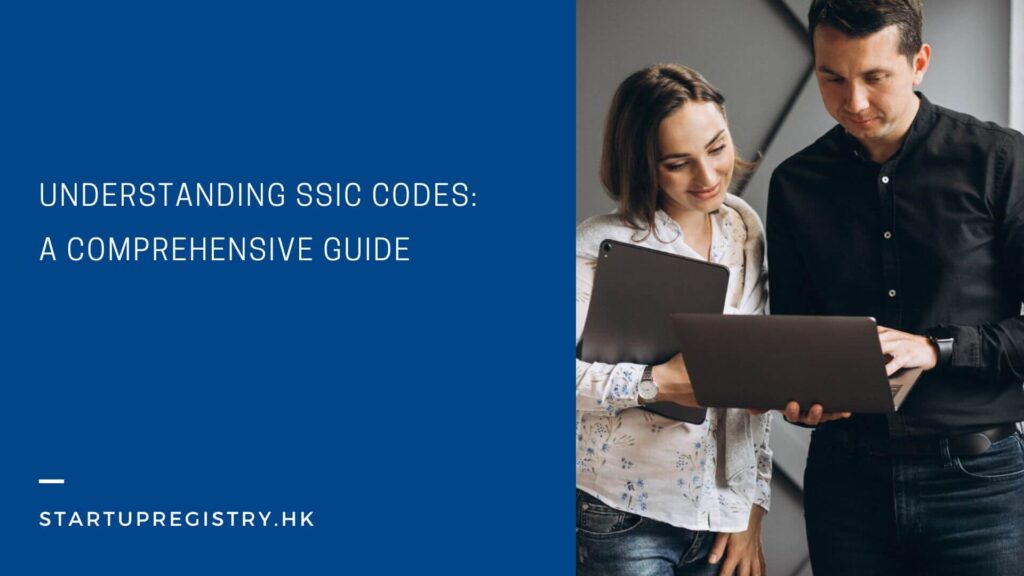Singapore Standard Industrial Classification Codes or SSIC Codes are the backbone of Singapore’s business landscape. SSIC codes are used across industries to classify and categorize businesses, which helps government agencies, investors, and owners of companies navigate the labyrinth of regulatory requirements, market analysis, and strategic planning. For any business operating within Singapore, from startups and online businesses to foreign investors and small business owners, understanding and selecting the right SSIC code is essential. SSIC codes for online businesses in Singapore might differ from codes for physical stores as they will come under the e-commerce industry.
This article gives an all-inclusive guide to SSIC codes, including definitions, why they are important, their purpose, their impact on business operations, and advice on how to choose the right SSIC code for my business in Singapore. We will also be discussing the impact of SSIC codes on business taxes in Singapore. Moreover, if you are planning to enter the Hong Kong market and want a trusted partner by your side, then there is a surprise for you at the end of the article.

What are SSIC Codes?
SSIC codes refer to the Singapore Standard Industrial Classification codes officially applied to classify business activities. It is a five-digit code used by the Singapore government to classify businesses based on their activities. The SSIC codes are managed and maintained by the Department of Statistics in Singapore. The Department of Statistics ensures that the various sectors of the economy make uniform and consistent classifications across all businesses. Each code represents a different industry or service, and each provides the government and other parties with a standardized way of knowing the character of business activities.
Determining the Licensing and Zoning Requirements
The main application of SSIC codes is simplifying and streamlining regulatory processes. For example, when a business registers with the Accounting and Corporate Regulatory Authority (ACRA), it must identify the SSIC code(s) that best describe its activities. This identification goes on to affect many different regulatory considerations, including tax rates and eligibility for government grants, licensing requirements, and other compliance obligations. SSIC codes in Singapore for small businesses play a vital role in determining whether your business is eligible for government grants and tax incentives. The Inland Revenue Authority of Singapore (IRAS) uses the codes selected by businesses to determine eligibility. Therefore, it is essential to choose the SSIC codes wisely for your company.
Ensuring Regulatory Compliance
The SSIC codes are structured hierarchically, thus dividing business activities into several levels, from more general industries to more specific activities. Economic activities can be categorized into three levels- Principal, Secondary, and Ancillary. The Principal Activity refers to the activity that contributes most to the value-added (VA) of the goods and services produced by the business. The secondary activity is the activity of third parties and is not the principal activity of a business. The Ancillary Activity is the activity that supports the primary activity of a business.
SSIC code normally uses five-digit numerical codes in which the first two digits will indicate a broad industry group, such as agriculture and fishing or manufacturing and the rest of the digits provide detailed classification. This sort of structure allows businesses to be coded highly specifically. For instance, under the heading of retail, SSIC codes distinguish between selling electronics, clothing, and groceries. Such specificity also helps in the execution of valid industry analysis, policymaking, and regulation.
How SSIC Codes Impact Your Business in Singapore
SSIC codes are of great significance for Singapore business registration. Registration for businesses in Singapore requires each businessman or woman to choose a specific SSIC code relevant to their firm. This selection is indispensable because it allows the government and regulatory agencies to create an overview of the nature of the primary and subsidiary businesses. The tagging of a particular business using these SSIC codes can facilitate the tracking of different business trends, observing relevant laws, and policymaking for specific industries.
Understanding the Market Trends and Competitor Activities
The SSIC codes affect government policies and regulations at multiple levels. Industry-specific policies determine businesses based on their respective SSIC codes. SSIC codes help determine government regulations and guidelines as they provide a detailed description of the number of businesses operating in a particular industry and what changes need to be made in the policies to manage the industry effectively. SSIC also plays a crucial role in deciding other essential needs like licensing requirements, zoning permissions, and so much more.
The bond between SSIC codes and government grants in Singapore is shatterproof. In Singapore, SSIC codes are directly associated with tax liabilities, grant eligibility, and other forms of financial incentives. The tax schemes and some grants by the government have been structured for specific industries. This means that a company’s SSIC code may determine its tax liability and access to grants. For example, small businesses under specific SSIC codes may be eligible for tax relief or access funding from the government, while others may not.
Foreign Investments and Insights
SSIC codes and licensing requirements in Singapore go hand in hand. SSIC codes help businesses identify the licenses and permits they need to operate smoothly in Singapore. For example, any business operating under an industry that requires special licensing will have its SSIC code prompt the relevant authorities to check whether the business operates within the stipulated health and safety standards. This allows companies to be compliant with all the licensing requirements in Singapore and saves them from potential charges and fines.
The data given by the SSIC code are necessary for business planning and market research in Singapore. SSIC codes and business planning in Singapore are no less than a lifelong story. This codes help a business to understand the complexities of the industry and make data-driven decisions. SSIC code allows for the analysis of market trends and the activities of competitors to identify customer demographics. Singapore is one of the major investment places, and foreign investors seek SSIC codes to compete within that specific sector, identify what may boom, and make decisive moves.
Choosing the Right SSIC Code
Although there are a multitude of SSIC codes for startups in Singapore, it is quite easy to choose the right one for your business. Here are a few instructions that can guide businesses and startups from Singapore on how to choose the right SSIC code.
- Analyze Your Core Activities
Start by identifying your core business activities and cross-referencing them with the relevant codes. Select a code that closely reflects your core services or products.
- Consult with Experts
Seek the advice of a business consultant or use online tools on ACRA’s website to identify the correct SSIC code. This reduces the chances of mistakes in the selection of code.
- Review Industry-Specific Codes
Industry-specific codes need to be reviewed for specific industries, such as finance, healthcare, or e-commerce companies. You must review industry-specific codes to choose the most appropriate one for the business.
- Use Multiple Codes if Needed
If you operate in diverse fields, then you can register your business under various SSIC codes related to respective business lines because this would allow all pertinent business activities to be noted.
Consequences of Choosing the Wrong SSIC Code
The wrong selection of the SSIC code may result in regulatory difficulties such as wrong tax rates, failure to get access to specific grants by industry, or even court penalties. Misclassification could also result in delays in getting licenses or permits and can even create tax compliance problems. Understanding SSIC codes for foreign investors in Singapore is highly crucial. Especially when they are trying to prevent unwarranted complications while coming to Singapore to set up a business.
Applying for Multiple SSIC Codes
Where a business engages in different activities, one can apply for various SSIC codes. For instance, retail business is also involved in wholesale activities. Then it would be prudent to apply for multiple SSIC codes. However, with an increased number of codes applied, compliance requirements, which may include licensing and tax implications, may also increase.
HSIC or SSIC? Do You Know the Difference?
Similar types of codes are used to classify the economic activities in Hong Kong. It is known as the Hong Kong Standard Industrial Classification Code (HSIC). The HSIC code serves almost the same purpose in Hong Kong as the SSIC code in Singapore. HSIC codes are utilized by the government to monitor businesses in the industry and make effective policies. If you want to know more about HSIC Codes then read Startupr’s blog on HSIC Codes.
Businesses that intend to begin operations in Hong Kong should contact Startupr. Startupr is a well-known service provider in Hong Kong. It can offer assistance with incorporation and maintaining your company in Hong Kong. The numerous services offered by Startupr can help you set up and run your business smoothly in Hong Kong. The services offered by Startupr are second to none and have proved to be beneficial for businesses. The wide spectrum of services provided by Startupr include business registration, company secretary services. Also business address and mail forwarding, annual return filing and many more.
Last update: October 2025


